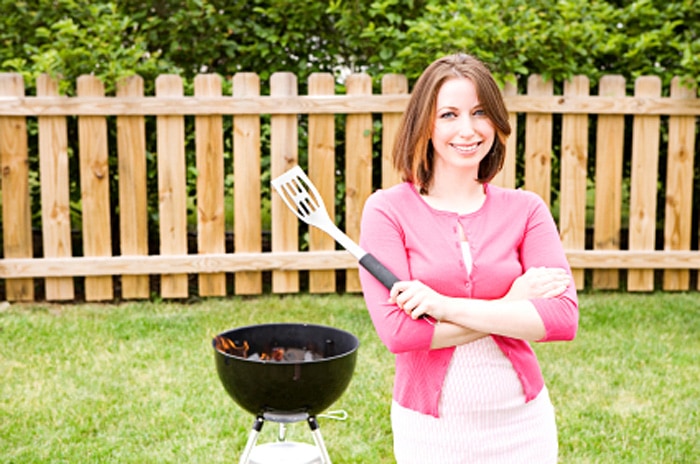
Written By: Beth Ehrensberger, RD
Title: Registered Dietitian
Alumni: University of Tennessee, Knoxville
Last Updated on:

When the weather warms up, there’s nothing better than eating – and cooking – al fresco. It’s becoming more common to see a member of the fairer sex behind the grill, but the truth is, many girls still leave the grilling up to the guys. Take it from this girl and reformed grilling ‘fraidy-cat, though… it turns out that what’s better than eating a grilled meal is eating a grilled meal you successfully prepared yourself! So if you aren’t the regular grill master at your house, and the thought of cooking over an open flame conjures up images of singed hair, toasted fingertips, and could-pass-as-shoe-leather steaks, read on. With a little basic know-how, you can expand your culinary repertoire beyond the walls of the kitchen.

Table of Contents
For beginners, it’s best to make your debut meal using something familiar to you. If you select a food you’ve cooked in the oven many times before, you’ll be more at ease with what you’re grilling, which relieves a lot of the performance pressure. For example, if you can practically oven-roast a pork tenderloin with your eyes closed, grilling it would be a great next step on which to build your skills. And to better ensure your success, it’s best to choose hearty foods like chicken, pork, or beef the first several times you grill. They can be easier to manage than, say, a delicate piece of fish, which can be tricky to flip, or shrimp, which is super-easy to overdo.
Having your grill heated to the proper temperature is critical to your success. For foods that require a short grilling time (like shrimp or tender meats such as a filet mignon), make sure your grill is set to a medium-high heat for best results. Making the mistake of cooking these foods too slowly over too low a temperature not only loses the all-important grill marks, but can also lead to overdone meat.
And while we’re talking temperature, one of the most important tools in your grilling arsenal is an instant-read thermometer. It’s not safe to depend on appearance to tell whether something is done (not to mention it’s frustrating guesswork). So how do you know the right time and temperature for what you’re cooking? A handy new way to keep the information of safe temperatures right at your fingertips is by downloading an app for your smartphone, like Weber’s on the Grill, where you’ll find loads of recipes and other tips, too.
Soaking meat in a marinade made from an oil-and-vinegar-type base can help minimize your exposure to some of the carcinogens that can form as a result of cooking over an open flame. Plus, a marinade can make lower-fat cuts of meat more flavorful and tender. And it doesn’t hurt that a bit of oil adds extra insurance for a moist end result, which is helpful for beginning grillers still perfecting the art of timing and temperature.
Since the mechanics of grill lighting vary by the type and style of equipment you own (not to mention this is the scariest part for some), the best way to learn to be a confident grill girl is to ask someone who is an expert griller to give you a hands-on lighting tutorial. But be sure your lesson gives plenty of low-pressure time to ask questions (in other words, not when you have dinner guests or a hungry family anticipating a meal), and when you can practice with a single test item together.
The best part about grilling is that it really doesn’t require a lot of hands-on attention – just a single flip is all you need for most foods. Try to resist the urge to overwork meats by pressing with the spatula. Too much flipping and pressing can coax out the natural juices, which practically guarantees your meat will be dry. Also, though your grilling utensil set probably came with a long-handled fork, toss it, and use only use a spatula or tongs for flipping meat; a fork pierces the food, allowing those valuable juices to escape.
Armed with a little practical knowledge and a big dose of confidence, girls can be the master of the flame – no charred fingertips required. And like any other skill, great grilling takes practice, so use every opportunity you can to get fired up!
Alumni: University of Tennessee, Knoxville – Beth Sumrell Ehrensberger is a Registered Dietitian and holds a Master Degree in Public Health. An experienced nutrition counselor, writer and public speaker, Beth specializes in translating complex nutrition information into practical concepts. Beth was awarded a Nutrition Communications Fellowship to the National Cancer Institute, and has worked on the internationally recognized Nutrition Action Healthletter of the Center for Science in the Public Interest.
bbq, grilling, home cooking, outdoor eating, seasonal celebrations